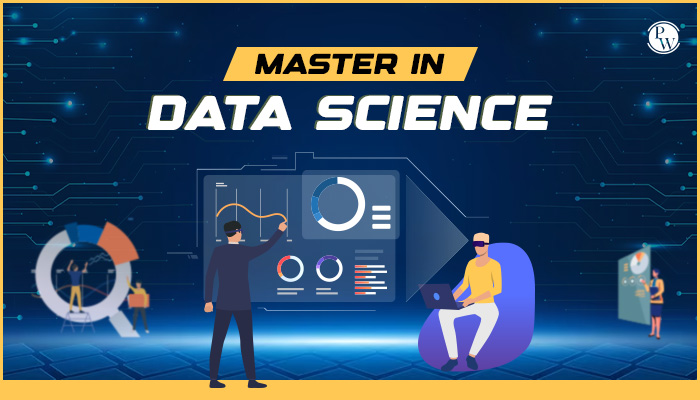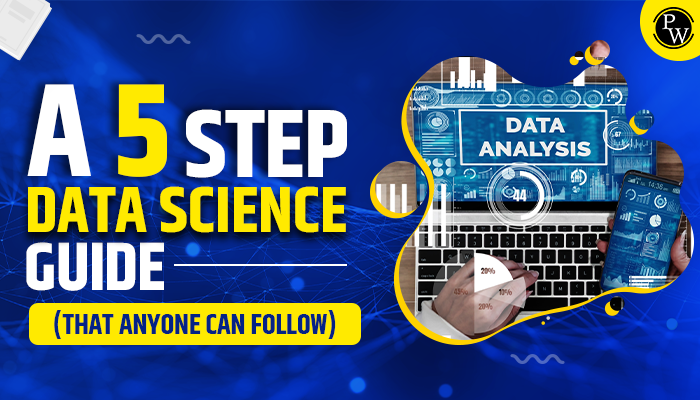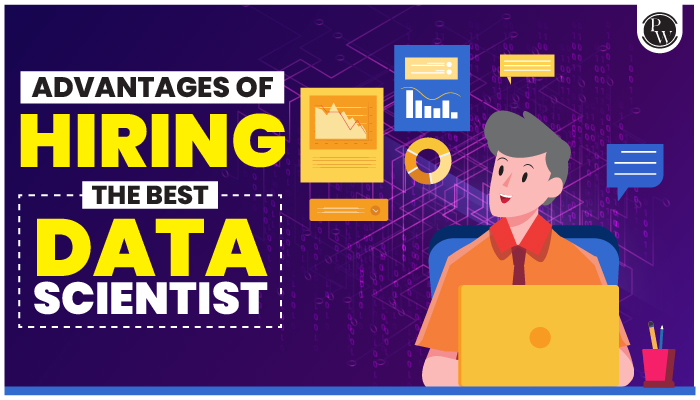Masters in data science: Masters in data science are an important part of the digital revolution. It is a place where technologies and smart, innovative ideas come together. Nowadays, businesses use a lot of data in making decisions that are important for the company and its future.
Pursuing Masters in Data Science will help you learn essential skills such as analyzing data, programming, and using advanced tools. You will also learn how to find important information in complex datasets. This course explores various topics like predicting trends and visualizing data. These skills are essential for solving real-life problems.
Data science course provides skills that can help you in prediction modeling, data extraction, machine learning, AI, visualizing, and Big Data. Also, you will learn to develop the skills of exploring, analyzing, managing, and presenting massive data sets using today’s technologies.
You can apply data science and analytical methods to address data-rich problems from various fields, think critically about data, and drive decision-making. Read the complete article to learn about more opportunities by doing Masters in data science.
Masters in Data Science Overview
The Masters in Data Science course is a specialized postgraduate program that aims to collect, assess, interpret, and use large data sets to deal with international problems. It is integrated with various areas, including the computer era, information technology, math, and domain knowledge, to arrive at accurate conclusions and smart choices.
In today’s data-driven environment, organizations in all sectors have large volumes of information. Students are given the knowledge and skills to explore this vast amount of data and make valuable inferences through a Master in Data Science. The study thoroughly overviews all data science life cycle stages, including collection, preparation, processing, visualization, statistical learning, Machine Learning, and Decision Making on data.
The students shall evaluate their skills in programming languages like Python and R, as well as their understanding of database systems and methods for extracting information from documents or big data technologies, at some point during the course. They shall be taught how to analyze paper and electronic data, develop prediction models, and use modern statistical methods to understand the styles and characteristics.
| Masters In Data Science Overview | |
| Aspect | Description |
| Degree Awarded | Master of Science (MSc), Master of Arts (MA), or Master of Engineering (MEng) in Data Science or a related field |
| Duration | Typically, one to two years of full-time study |
| Curriculum |
|
| Educational Qualifications |
|
| Career Opportunities |
|
| Industries | Technology, healthcare, finance, marketing, E-commerce, government, research institutions, and more |
| Salary Range | Attractive salary due to high demand. However, salary varies based on experience, location, and job role. |
| Certifications | Industry-recognized certifications, such as those from Microsoft, Google, and AWS, are available for specific data science tools and techniques. |
Masters in Data Science Syllabus 2023
Students need to study the following topics in the Masters in data Science academic year:
| Masters in Data Science Syllabus 2023 |
| Introduction to Data Science |
| Fundamentals of Data Science |
| Machine Learning |
| Learning from Data |
| Data Science Research Projects |
| Digital Business Models |
| Statistical Data Modeling |
| Nature Inspired Computation |
| Research Methodology |
| Evolutionary Computation and Optimization |
| Computer Vision |
| Social Networks and Text Analysis |
| Big Data Technologies |
| Data Mining Techniques |
| Deep Learning and Neural Networks |
| Natural Language Processing |
| Time Series Analysis |
| Reinforcement Learning |
| Data Ethics and Privacy |
Recommended Course
- Decode DSA with C++
- Full Stack Data Science Pro Course
- Java For Cloud Course
- Full Stack Web Development Course
- Data Analytics Course
Masters in Data Science Career opportunities
Many career opportunities are offered in different sectors when you complete your Masters in Data Science. Also, you might want to consider the following career paths:
| Masters in Data Science Opportunities In 2023 | |
| Career Path | Description |
| Data Scientist |
|
| Data Analyst |
|
| Machine Learning Engineer |
|
| Research Scientist |
|
| Business Intelligence BI Developer |
|
| Data Architect |
|
| Data Engineer |
|
Masters In Data Science Benefits
There are several benefits to be gained by pursuing an MSc Data Science degree, which can help you advance your career. Here are a few straightforward explanations of the advantages:
- Customizable course curriculum with stackable certificate options: An MSc in Data Science program typically offers a customizable curriculum, allowing you to tailor your studies to your interests and career goals. Furthermore, to increase your professional experience and marketability, you can take advantage of multiple certificate options within specific fields of Data Science under certain programs.
- Team-based capstone project: Some data science masters in data science programs include team learning projects in their curricula. This project will allow skills and knowledge gained during the programming to be applied to actual, realistic scenarios. Teamwork and communication skills are developed through collaboration with a team while working on an actual project.
- Personalized academic and career advice: To support your individual needs and goals, MSc programs provide personalized guidance in academics and careers. You may be assisted by academic advisers to select classes, explore research opportunities, and ensure that you stay in line with your course requirements. Career advisors can provide Guidance on conducting a job search, building resumes, preparing for an interview, and networking.
- Entrepreneurship opportunities through Innovation Labs: Masters in data science degree programs offer entrepreneurial opportunities through initiatives such as Innovation Labs. These programs are designed to provide support and resources and mentoring to help you discover business ventures and turn your data-driven ideas into profitable enterprises.
- Professional research possibilities: Master in Data Science programs may offer the possibility to develop professional experience and be part of some of the world’s most exciting data science research. Research projects can help you understand the concepts and methods of data science in a better way while also strengthening your profession’s network.
- Membership in the alumni association upon completion of your Masters in Data Science: You will normally be a member of the alumni association at the end of each semester. The membership shall allow access to the network of professionals with expertise in this field and thus provide mentoring, collaboration, and career advancement opportunities.
PW Skills Provide Various Platform
Masters in Data Science Eligibility
Students must have some prior knowledge before preparing for the Master in Data Science. Let us know the eligibility of the Masters in Data Science.
| Masters In Data Science Eligibility | |
| Prerequisite | Description |
| Bachelor’s Degree | Bachelor’s degree in Computer Science, Statistics, Mathematics, Engineering, or related field. |
| GPA (Grade Point Average) | A minimum GPA requirement is often around 3.0 on a 4.0 scale. Academic solid performance enhances your application. |
| Programming Skills | Proficiency in programming languages such as Python, R, Java, or C++. Knowledge of data structures and algorithms is beneficial. |
| Data Structures | Familiarity with basic data structures and algorithms used in computer science. |
| Database Knowledge | Understanding database systems, SQL, and data manipulation is valuable. |
| GRE/GMAT Scores | Some universities require several test scores such as GATE, CAT, etc. |
| Letters of Recommendation | Typically, 2-3 letters from professors or employers can refer to your academic abilities and potential in the field. |
Recommended Reads
Data Science Interview Questions and Answers
Data Science Internship Programs
IIT Madras Data Science Course
Masters In Data Science FAQs
What are the entry-level eligibility criteria for Msc. in data science?
Students willing to enroll for a Master's in Data Science have to fulfill the following entry-level requirements:
Graduation in disciples such as mathematics, statistics, Physics, and other related technical domains.
Basics of Python, students must understand the fundaments of Python programming language.
Basics of statistics and probability.
What are the admission fees for students to enroll for Msc. in Data Science?
The fees of Masters in data science depend upon the institute. Although for government institutions, the fees for a master of data science degree in India range from approximately INR 1 00,000 to 5 000 per year. In some cases, there may be an increase in the fees paid by Private Institutes of as much as INR 2 000 to 10 000 per year.
Is Msc. in data science worth it?
The field of Data Science, which contains complex techniques and tools, is rapidly developing. The MSc program fully explains data science concepts, algorithms, and methodologies. This offers a unique opportunity to explore some of the most relevant areas, e.g., Natural Language Processing, Computer Vision, and Big Data Analytics. You can take an edge in the sector with this specialized knowledge.





